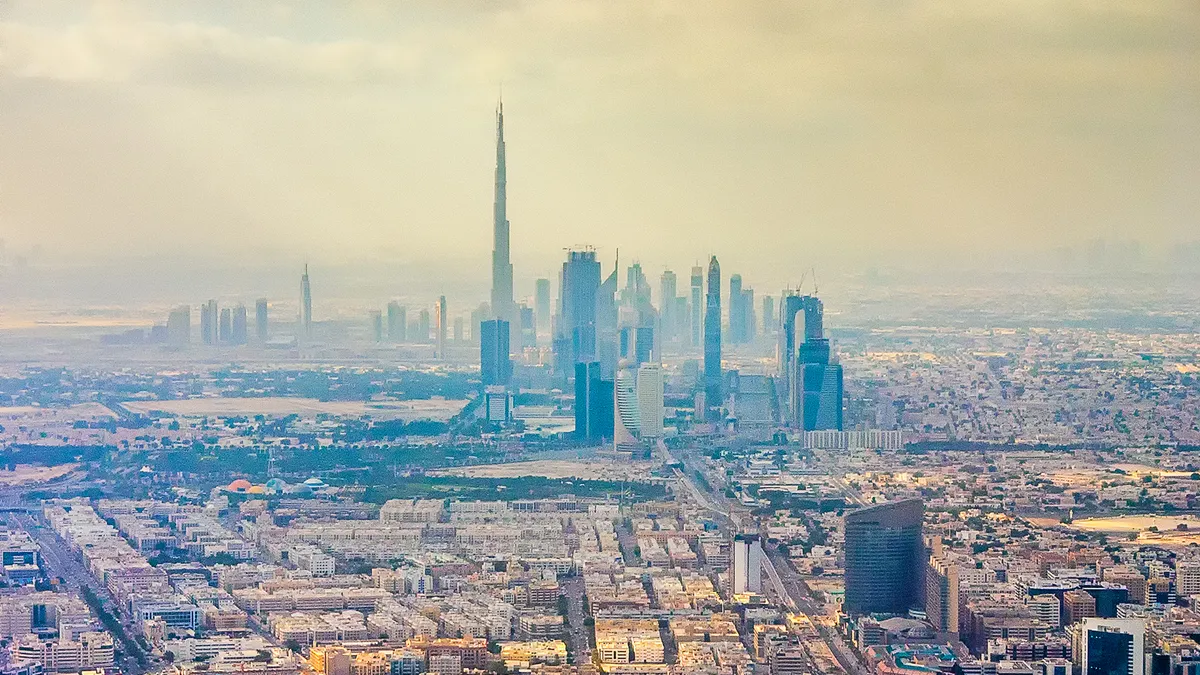Dubai is more than halfway toward its goal of going completely paperless and cashless by December 2021, and is looking to emerging technologies like blockchain to help it reach its goal.
In an interview with Smart Cities Dive at the World Bank headquarters in Washington, DC last week, Aisha Bin Bishr, director general of the Smart Dubai government initiative, said the aim is to make Dubai the "happiest city on Earth," and that technology can help it get there.
“To do whatever we do, by bringing on board these technologies, the end goal is not the technology per se, it's how these technologies will enhance people's lives and will improve their happiness,” she said.
Zeina Kaissi, head of emerging technology and global partnerships at Smart Dubai, told Smart Cities Dive the use of blockchain for transactions could unlock "major potential in the way governments and citizens interact and the way transactions can be built, even pushing that boundary into transforming the role of government because of the impact of the technology itself on the way the interaction happens."
Bin Bishr said the city government uses 1 billion pieces of paper to serve a population of just over 3 million people, and in the first phase of implementing its paperless strategy, the city has reduced its paper use by 57%. She said by cutting that paper usage down to zero, the city could save enough money to feed 130 million children across the world and preserve almost 130,000 trees, which would cover an area five times the size of Central Park in New York City.
She also noted that going paperless could save residents time, something that is in keeping with a report by Intel last year that found the introduction of various smart city technologies could help city residents save 125 hours per week.
Kaissi said the effects of that time-saving can be seen in transactions like buying a house, which in Dubai can require documents totaling several hundred pages to be read and signed.
"If you baseline the current state, you figure out how much time is wasted from the user, how much paper is wasted, how much money is wasted in this process,” she said.
Using blockchain could help make things more efficient in those transactions, Kaissi said. The technology has long been touted as a possible way for governments to become more efficient, and she said the Dubai Blockchain Strategy has that at its core as it looks to use it in different ways.
In U.S. cities, there have been concerns raised over moves towards going cashless, especially in areas like public transportation that some sections of the population rely on yet may not have access to smartphones, bank accounts and other gadgets. In Philadelphia, the concerns about going cashless resulted in the city council banning cashless stores, with similar legislation under consideration in New York City and New Jersey.
Bin Bishr said Dubai would continue to have government centers available for people to carry out their transactions with public sector agencies in the traditional way, and is working with countries like Sweden — also moving towards a cashless economy — to share best practices and tips. She said when looking to go cashless, it is imperative to build trust and relationships with residents to ensure no one feels left behind.
"You need to work very closely with people, because if your citizens or residents are not up to date in using technologies, this is a major issue,” she said.
And Dubai may have an advantage, Bin Bishr said, as its population skews younger and more tech-savvy than many other cities. She noted the explosion in use of smartphones and other connected devices, which has changed the nature of the city’s economy, and said that while younger generations want interactions with government to be easier, it can be challenging to change governmental processes.
“Our kids nowadays, they order everything from their devices: like Uber, ordering a book, ordering food, shopping online,” she said. “Rarely we go to the market nowadays to buy clothes. And they expect the government to do similarly. But internally in the government, they say, 'No, I need to stamp the document, I need to sign it physically, I need to see it physically.' This is the most difficult part to change: our perception towards paper and to adopt more digital systems.”












